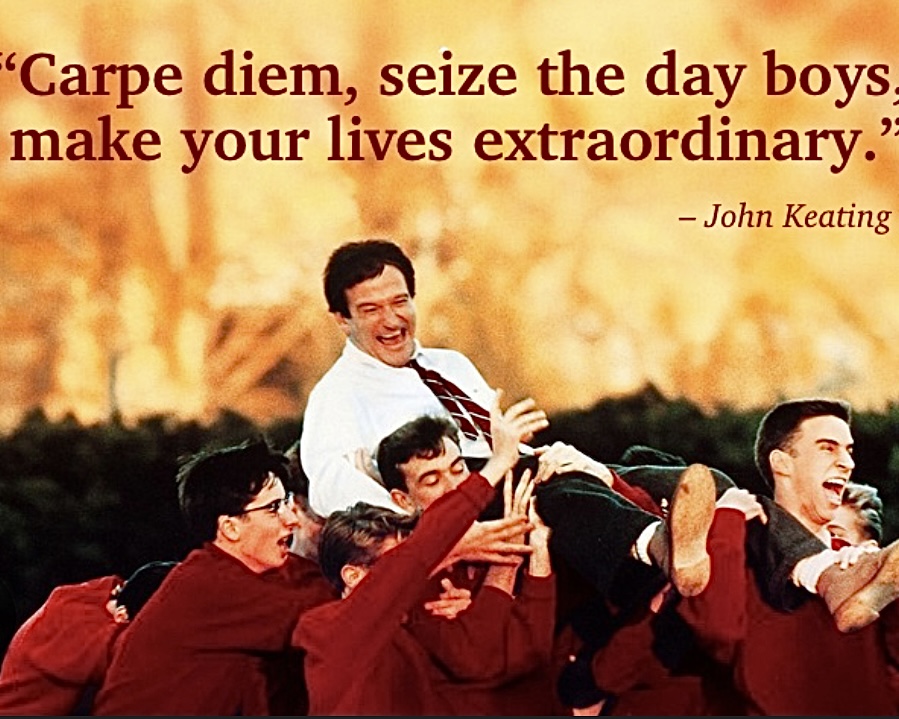“Carpe diem. Seize the day. Make your lives extraordinary.” These lines spoken by English teacher John Keating (played by Robin Williams) are at the core of the movie “Dead Poets Society.” I remember first watching this movie as a teenager and being completely enthralled with this scene and it’s message. As a young man with my whole life in front of me, how could I not be inspired? However, I’ve come to realize the message from the movie has both good and bad consequences, depending on how Carpe diem is understood, and it is this that I’d like to unpack.

First, why live a Carpe diem life? In the movie, Mr. Keeting shows his current students older pictures of former students from the school. He says these former (and now deceased) students would share their legacy to the current ones to “seize the day.” Why? Because, as Mr. Keeting says, they are now “fertilizing daffodils.” He tells the current students that we are all “food for worms…One day we will turn cold and will die.” His understanding of life is that of Naturalism, meaning there is only the physical life, with no soul or spiritual part. Life ends at the physical death, and so “eat, drink, and be merry because tomorrow we die” is the reason for Carpe diem living. Sounds reasonable. However, there are real consequences to this understanding of life, and it’s vividly displayed in the movie.
Neil Perry is a student in the movie who wants to be an actor, but his father wants him to go to medical school. His father demands he stop acting in plays, but Neil lies to him and continues to act. When he gets caught by his father at a production where Neil is the star actor, he is told he is being punished and sent to military school where he will never act and will instead go to medical school. That night Neil kills himself. How terrible and sad. While the movie doesn’t dwell on this, I think it’s very important to understand why the Carpe diem mentality taught to Neil played a major role in his suicide. When the physical life is all there is, then it’s great while we are enjoying the “eating and drinking.” But what about when we are “starving?”; when we run into trouble and difficult times? Then if this life is all there is, then why not end it? You see, this is the same mentality of Albert Camus. He famously wrote “Should I kill myself, or have a cup of coffee.” It’s this thinking that life has no deep meaning, only the meaning the person desires or creates (Existentialism), that leads people to suicide when life comes up short to those desires, such as in Neil’s case. Now, is there a different view to live a Carpe diem life?
In the Bible, it teaches we have a physical and a spiritual part within us, and that our life continues even after our apparent physical death. While we should enjoy life and the good times (Ecc 3:12-13), we should live with understanding that life has a deeper meaning to it, ultimately that we know and love God. We can look forward to what awaits us after death, but our Carpe diem living is driven to show others the love and peace of God (Eph 5:15-16). You see, with this understanding, a person can keep going through times of “starvation,” knowing better times are ahead (Rom 8:18). We can live life, seizing the day, during good or tough times, because God and his eternal life is available to us so we won’t just be “food for worms.”
It’s an amazing challenge to live each day, seizing what it has for us. But that is often what our daily lives really are, a challenge. To really live in the moment; deeply enjoying the good times, yet able to persevere through difficult ones. “Faith is the assurance of things hoped for; the conviction of things not seen” (Heb 11:1, ESV). It’s this assurance in faith and hope of eternal life through Jesus Christ that allows a Carpe diem mindset to drive not only our daily lives, but also our eternal ones.
“So I concluded there is nothing better than to be happy and enjoy ourselves as long as we can. And people should eat and drink and enjoy the fruits of their labor, for these are gifts from God.” Ecc 3:12-13, NLT.
